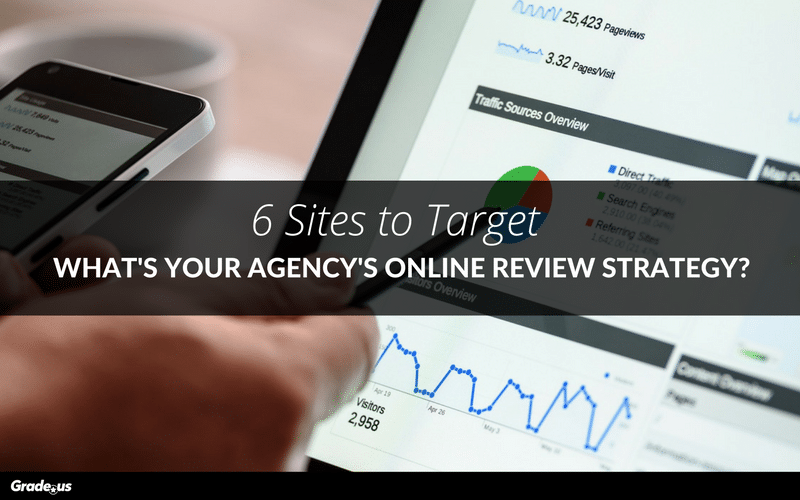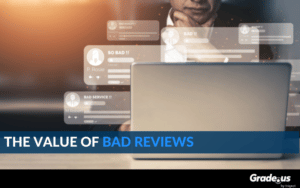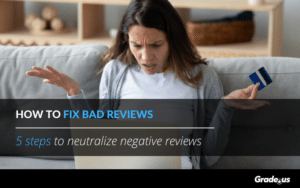Acquiring clients is the worst. Networking plays a massive role, so does word of mouth. But when it comes to your digital efforts, what is your agency’s online review strategy?
Getting clients is a struggle for many agencies. The demands, the requirements and hoops clients push you to jump through. It’s a headache that only seems to get worse with time. It’s no surprise that many agencies continue to depend on referrals for new business.
In the past, marketing agencies would primarily depend on networking or referrals. They’d reach out to old clients, ask for introductions, head to events. They’d slog through poorly crafted RFPs, the demands for spec work (that you know they’ll use without paying for), competing for a chance to win their business and their general I-don’t-need-you attitude.
This behavior starts with fear.
Clients are afraid they’ll make a mistake. Nervous they’ll choose the wrong agency. Terrified a mistake will cost them their business, money, or reputation. Because the last thing they want is to lose face.
It’s tedious and unlikely to change unless you have a reputation of your own.
A powerful reputation changes a client’s mindset
When clients meet you for the first time, whether it’s in person or digitally, they make snap judgments about you – your trustworthiness, reputation, ability, etc. This judgment is typically a first impression; it’s dependent on the limited information they have about you to begin with. Agencies don’t usually provide enough information on their business or services so the relationship starts off at a deficit.
The lower your credibility, the worse their behavior.
The good news is there are lots of ways to create a stellar reputation. Becoming a thought leader by writing educational and genuinely useful content. With achievements (e.g. badges like Google Verified Partners or Local Chamber of Commerce Associations). Winning awards at the local and national levels – these are all legitimate methods agencies use to boost their credibility and reputation. But there’s one hidden strategy that trumps all the others.
You guessed it, I’m talking about reviews.
Reviews from other clients boost your profile with prospects like nothing else (especially when prospects don’t have anyone to give them a referral). It’s a strategy most agencies aren’t using. Small business owners are going to review sites to find digital marketing agencies to hire.
Your existing clients, the ones who have spent their money with you, are willing to tell the world that you’ve done amazing things for them. The more specific and detailed client reviews, the easier it is to attract new clientele.
But your reviews are doomed to fail if they’re missing the right ingredients.
Let’s cover those first.
Reviews work *if* they answer the right questions
Our business clients know the game. They know the difference a stellar review can make for your agency, they want the same things from their customers. This means they’re often more willing to give you a glowing review – if you do the right things.
So what is the right thing?
Well that all depends on the kind of relationship your reputation has established. If your agency’s reputation is negative, or just as troubling, non-existent, selfish or dysfunctional clients may demand that you bend over backwards to please them. They tell themselves “You need me more than I need you”; This means they’re more likely to…
- Haggle over prices
- Push, squeeze and hammer their agency for control
- Encourage agencies to beg for their business
- Bury their agency with pointless busy work
If your agency’s reputation precedes itself via the attributes mentioned above (or is at least growing), prospects will approach you with respect and genuine interest. These customers will…
- Be open and honest about budget constraints
- Collaborate with their agency, trusting their judgment and expertise
- Avoid cattle call style RFPs, choosing to approach a limited number of agency candidates instead
- Focus their agency on the goals and objectives that matter to them
Good prospective clients ask very different questions. Which, as it turns out, are exactly the kinds of questions you’d expect a prospective client to ask; “Do you have any other clients like me? How did you help them, what were the results, etc.” Poor clients tend to ask very different questions, e.g. “the ideas I have are the ones that work best. Here’s what I want you to do…”
Client questions signal intent.
Your clients want to see amazing reviews
They’re looking for the diamond in the rough, the agency that’s going to help them achieve the results they desperately need. They may not understand what they need, but they know that the results should be focused on building their customer base and increasing their bottom line. They want to see glowing reviews from incredibly happy clients.
Here’s why that’s a problem.
When it comes to reading reviews there are two types of customers.
-
1. Rookies. these clients know they should look for reviews. Problem is they’re inexperienced. Do they need an SEO specialist, a PPC expert, or a content marketing strategist? They don’t know what they don’t know. Most So they start with mainstream sources like Google, Facebook, Yelp, etc.
-
2. Veterans. These clients are sophisticated. They know enough about the industry to pursue industry credible, industry specific reviews. They’ve most likely vetted various agencies in the past and have an understanding of the various services they need. They gravitate to sites that cater to or focus on specialty areas. Often times they think they know as much as you do.
This presents a problem though, doesn’t it? Who do you pursue? Which client do you focus on?
You focus on both.
As an agency you’re never really sure who you’ll get. If you’re looking for more lucrative clients who value your work and have a larger marketing budget, you may focus your attention on the veteran. If you’re just starting out, don’t have the portfolio you need, or you’re looking for clients you can train you may want more rookies.
Know who you want? Pursue them.
It’s still an important idea to pursue both. Why, you ask?
Because (a) you don’t know who you’ll get (b), there’s no way for you to control who comes to you (unless you reject them outright) (c) serving both gives you the opportunity to develop your agency – whether that’s educating or delivering results. A sophisticated veteran could share a positive review with a rookie to help them out and vice-versa. A rookie may realize they’re in over their heads. They search for an industry website or blog post, in hopes of getting a veteran’s recommendation.
Since most digital marketing is all about visibility, where should we start planting our flags on the digital landscape?
Go mainstream with your reviews on the majors
Then, add in niche online review sites and industry focused sites. Focus your attention on mainstream sites to attract rookies, specialty and industry sites to attract veterans.
Mainstream review sites
A quick search in Google using the query “digital marketing agency new york” brings up.
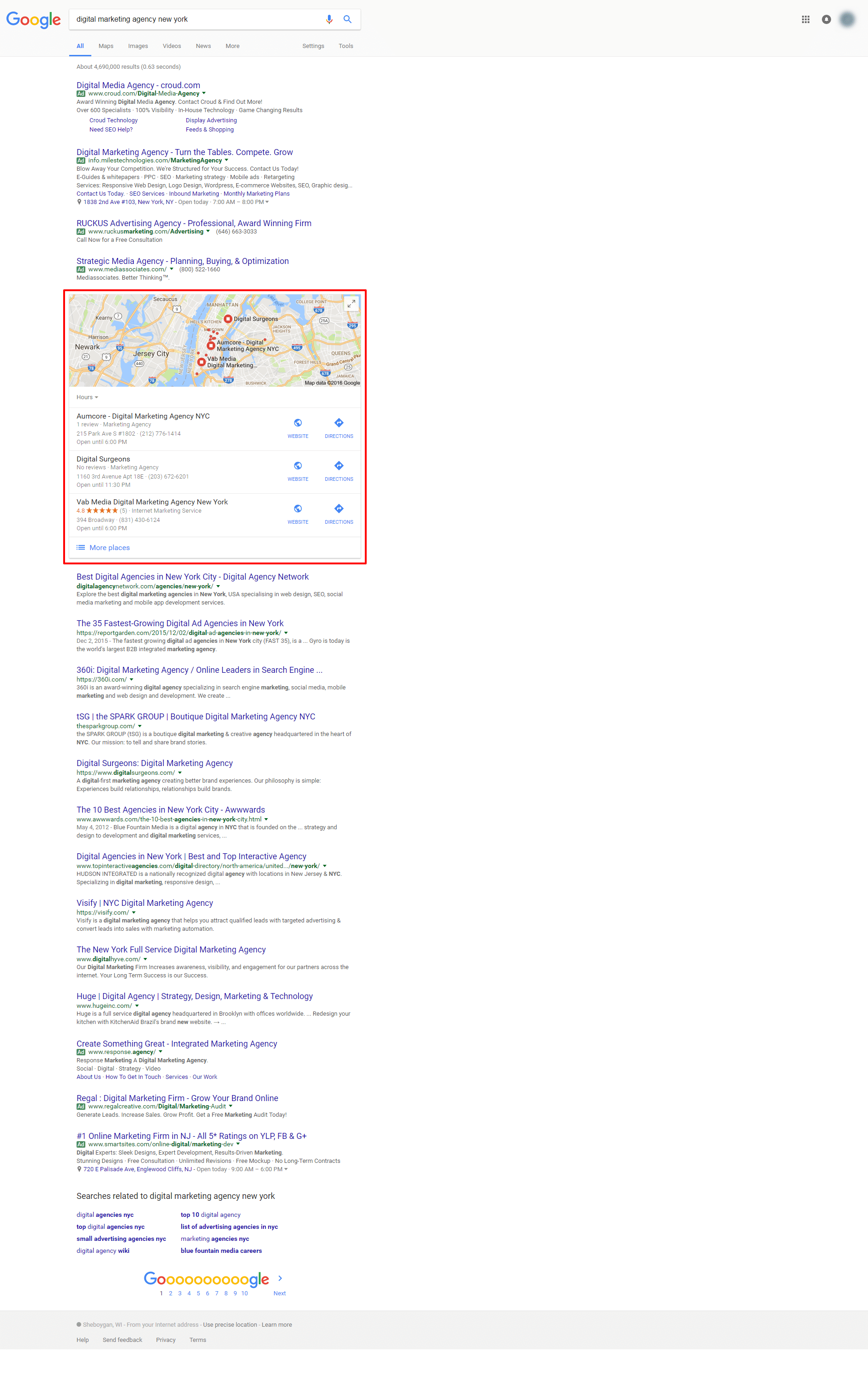
Click “more places” and you’re greeted with this:
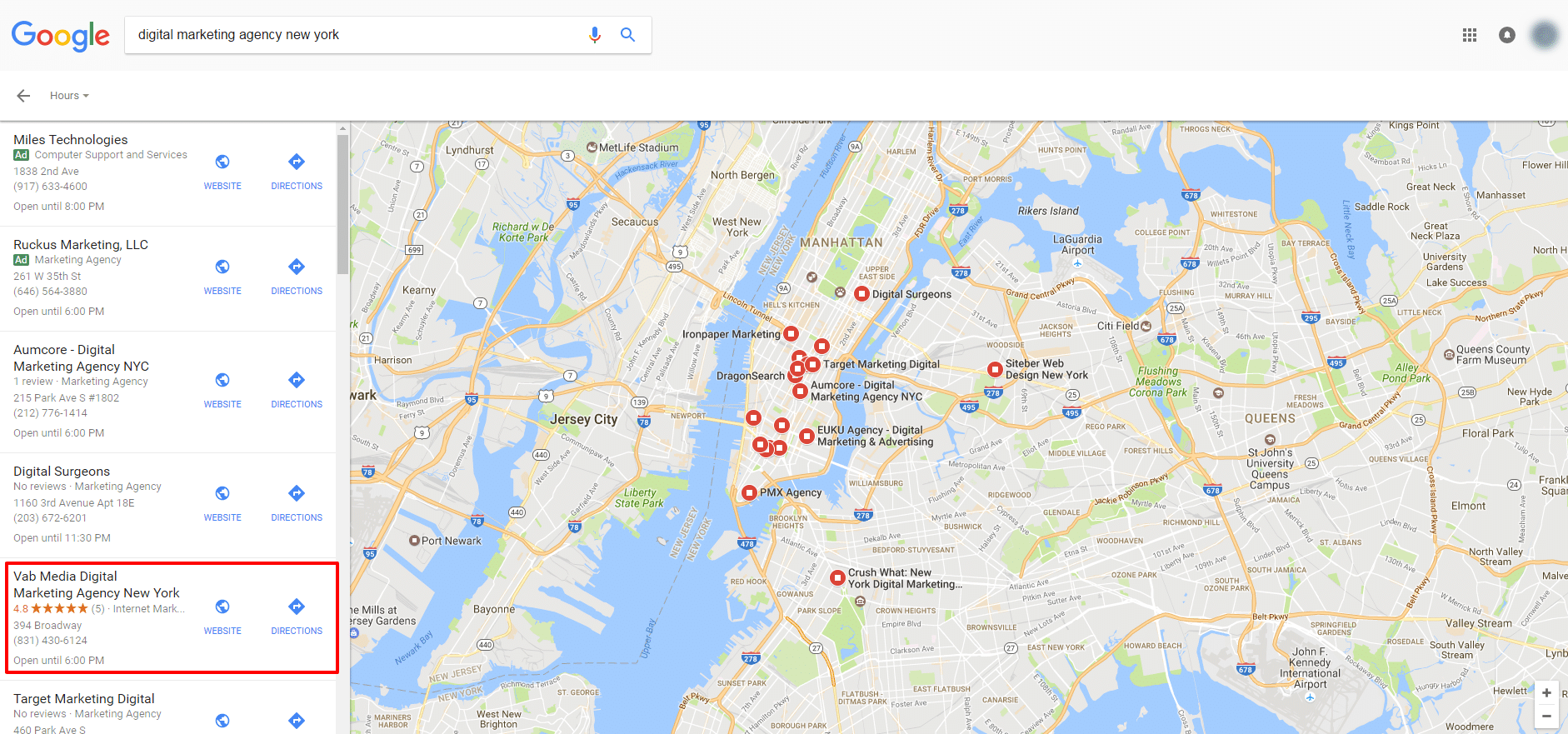
Search engines and popular sites can provide agencies with much needed visibility, a feature that can work for or against you. Used well, search engine results pages form positive first impressions with clients.
1. Google and Bing
Google and Bing are mainstream sites. Most customers start their search here making this channel incredibly important. General or location specific search queries bring up local results, while branded terms bring up, special reviews If clients search for you by name, location or keyword there’s a good chance you’ll show up, if you’ve optimized your Google listing and Google reviews.
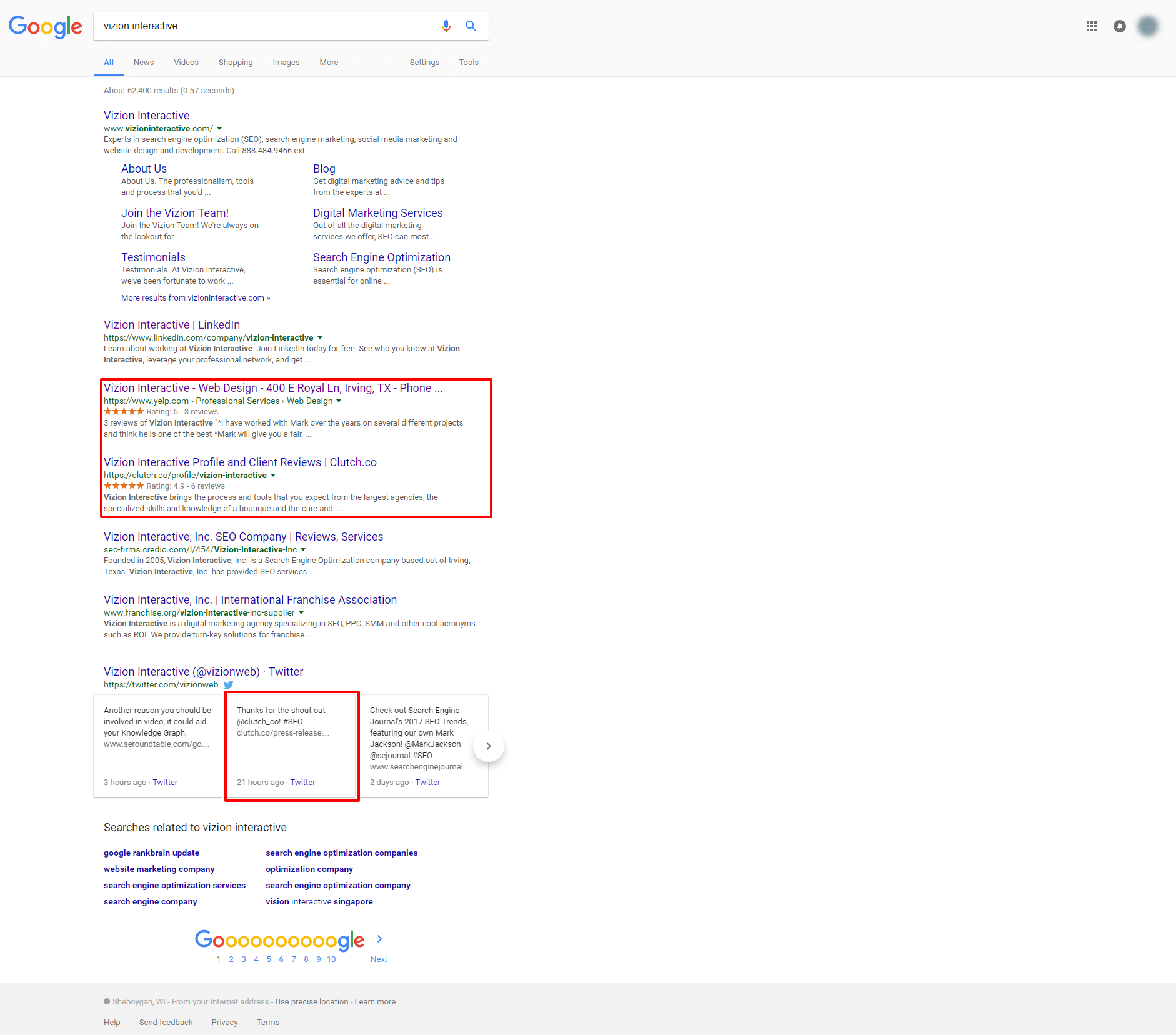
Pros
- Hundreds of keyword opportunities
- Impressions, clicks, leads continue to grow with consistent effort
- Attracts both rookie and veteran clients
- Most visible digital channels on the internet
Cons
- Reviews are sticky
- Large ratio of negative reviews can severely damage your reputation
- Negative reviews are difficult to bury
- Most visible digital channels on the internet
2. Facebook
Facebook recommendations are becoming more important in the online review space, due to the pervasive and social nature of the channel. Like a page, write a review, interact with someone and most of your friends will know. Remember the saying “good news spreads fast but bad news spreads faster?” With Facebook that’s literally true, for better or worse. Pros
- Reviews, if created properly, will spread quickly
- Trending and viral reviews can dramatically shift PR
- The right story can be shared repeatedly, indefinitely
Cons
- Bad reviews, if shared inappropriately may become trending stories
- Negative trending and viral content (like negative reviews) can destroy your business
- You lose control of the message once it’s out
3. Yelp
Yelp’s strong search visibility means your Yelp reviews are far more likely to show up. Searching for your agency is a common first step; Yelp tends to attract rookie clients so a search results page that’s filled with positive reviews is a helpful way to get the conversation started.
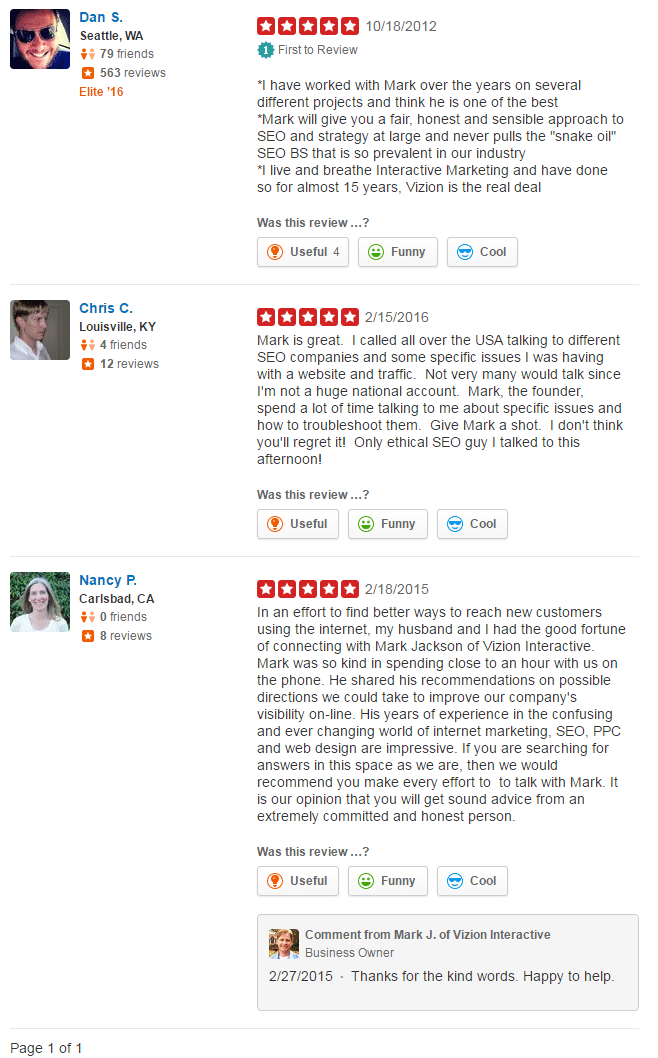
Pros
- Strong search engine visibility
- Savvy and intensely loyal community
- Agencies have the opportunity to discuss reviews with reviewers
- Surprisingly, not a lot of agencies are actually claiming their Yelp pages! Be there before the competition is
Cons
- Search visibility means negative reviews won’t go away
- Loyal community can review and ruin companies they don’t like
- Agencies aren’t as visible on Yelp (also a pro)
- Infrequent Yelp users might have their positive review hidden from recommended reviews
Specialty Online Review Sites
1. Clutch.co
Clutch.co shares client reviews of top performing service firms. They present their reviews in a case study format which is perfect for digital marketing agencies looking to attract client attention.
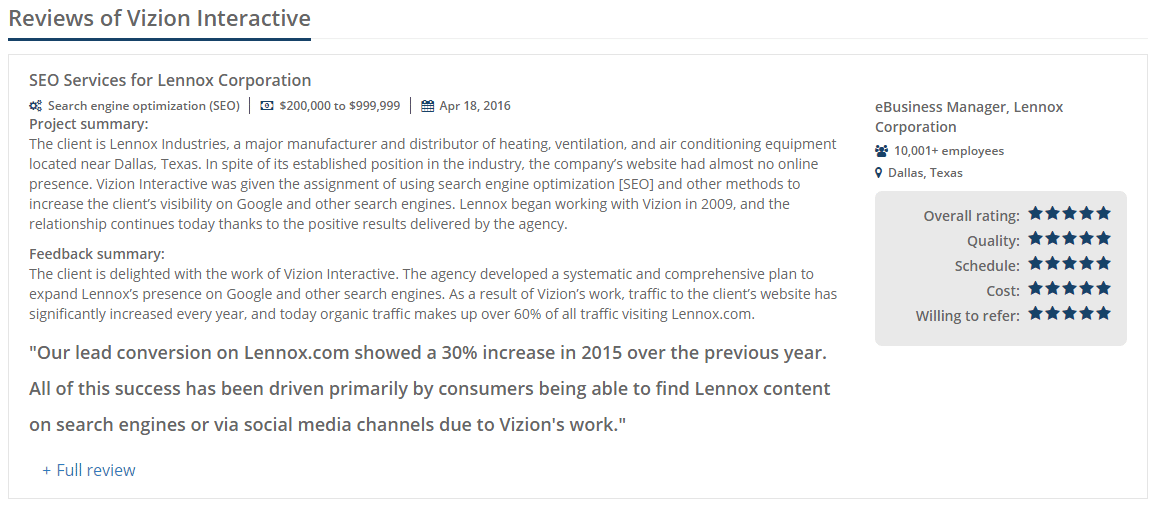
Pros
- Clients tend to be generous with positive feedback
- Will conduct a 15 minute phone interview and write up your client’s review
- Verified reviews by signing in with LinkedIn
- Strong domain authority and search visibility
- Online Review comparison site 100% dedicated to Agencies, Firms, and Digital Services
Cons
- Clients reviews are anonymous
- Clients tend to be polite, not as open to sharing
- Difficult to differentiate between reviews/agencies as most have four and five star reviews
- Competitors are side by side with your Agency’s profile risking being outshined
2. UpCity
UpCity knows it has two distinct audiences and works hard to provide value to both.
On the agency side, UpCity provide growth tools to help promote their offering and get in front of small and medium sized businesses. UpCity is also great for small businesses to find the best Local, Web, SEO and PPC focused agencies.
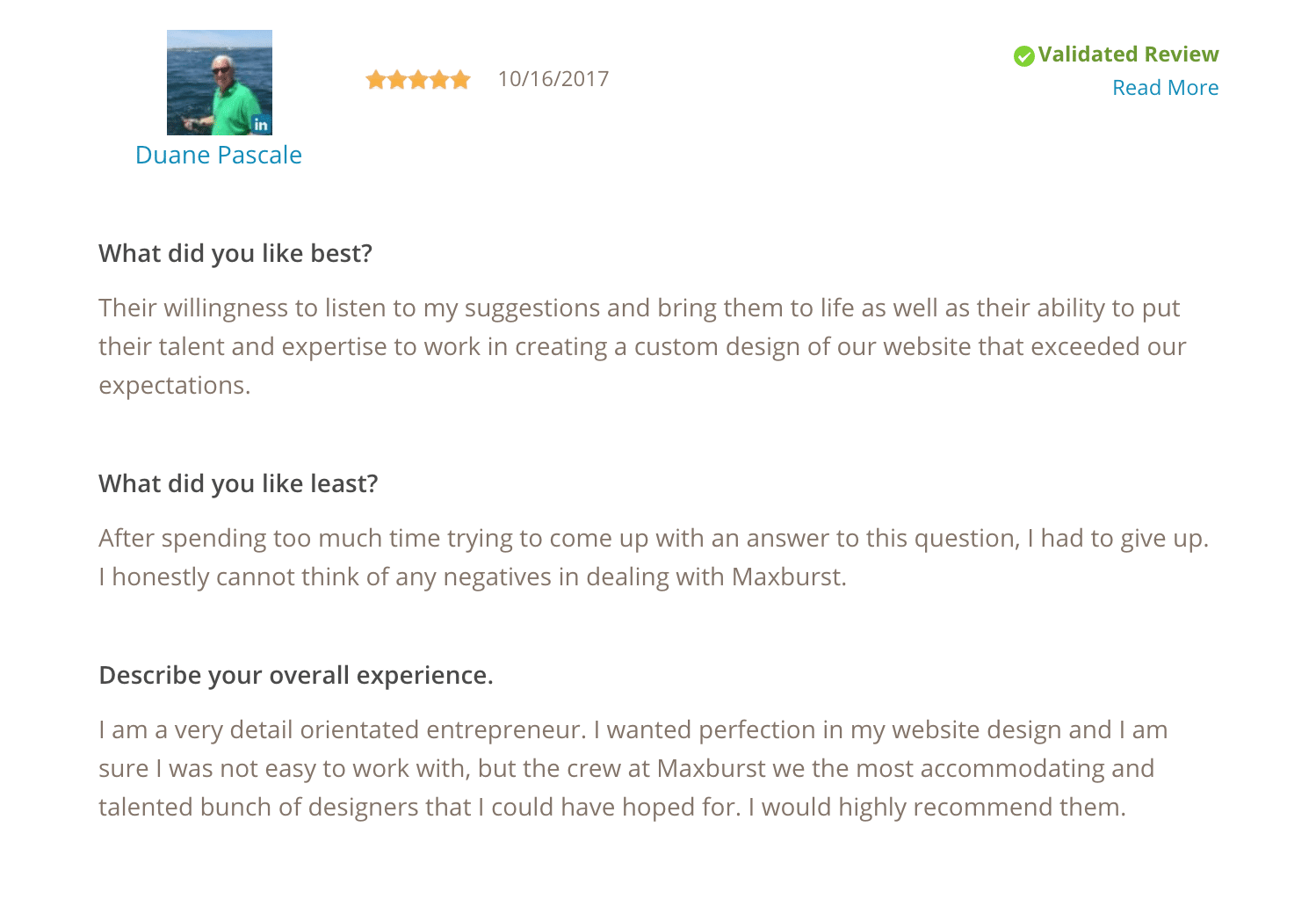
- Provides a high value checklist of the types of services and clients that the Agency serves
- Helps you find an agency that you can meet face to face with location focused search
- Validated reviews – all reviews must comply with the community guidelines.
- Not many agencies have reviews. Easier to stand out among competition.
Cons
- Not a lot of detailed info in the reviews about the experience.
- Not every city is represented, which makes visibility tougher if your location isn’t represented.
- The Agency listing is slightly limited in content.
3. Glassdoor
Glassdoor is a review site for employees and former employees. Savvy veteran clients head to Glassdoor when they’re looking for the gritty details no agency shares willingly. It gives you an opportunity to show your house is in order and ready to perform.
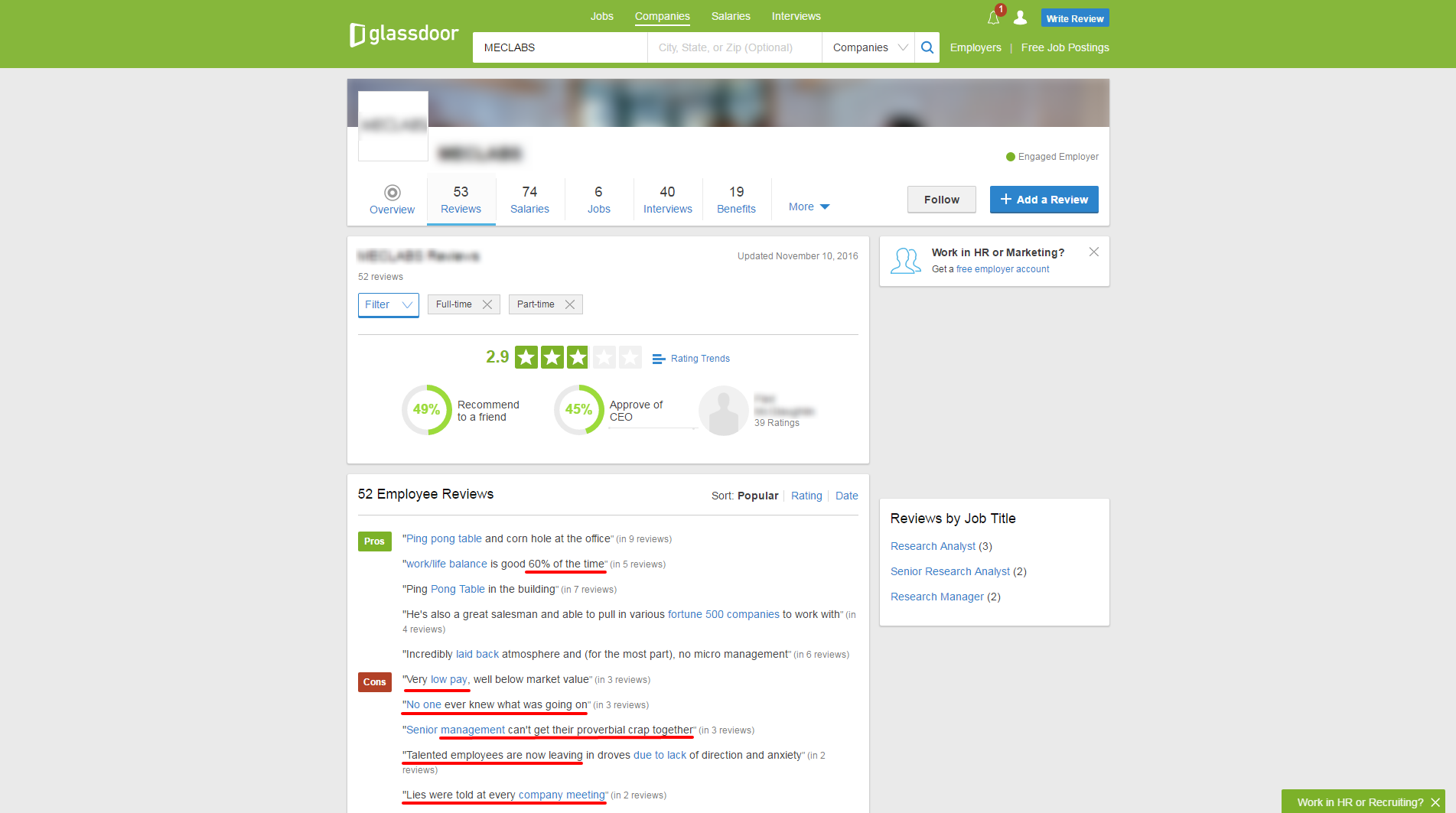
Pros
- Gives clients insights no agency volunteers
- Shares important details about the culture and character of your agency
- Helps you flush out serious workplace problems
- Strong search visibility means reviews show up for agency branded keywords and phrases
Cons
- Hire the wrong employees and it becomes a weapon
- Internal problems may scare customers away
- Encourages fearful employees to hide from their problems
- May encourage fraud and dishonesty
- Not a ton of people will go to Glassdoor to vet Agencies, even veterans
Here’s the great thing about these review sites. They’re powerful marketing channels you can use to attract new clients. Create the right kind of conflict,. Get clients to include that (along with the solution) in their reviews. Combine this with the right keywords and you have a powerful way to attract new clients.
Clients want conflict in your reviews
They look for the fear, doubt and risk. They want to see the challenge or difficulties your clients arrived with. Were they losing search traffic? Did a previous marketing campaign fall flat? Did they walk away from their previous agency?
Why? What went wrong?
Next, they’ll want a detailed breakdown of the solution, what you did, why you did it – process, scope, cost, etc. Here’s the tricky part. It’s common for knowledgeable clients to go technical. They want to look good so they’re using jargon, specifications and technical language.
Naturally, this causes clients to glaze over and tune out, especially rookies who have no idea what they’re talking about.
But that’s not the end of the world.
You can recover, if you get your clients to focus on their results. This section of their review should answer one specific question.
What did they achieve for you?
This is about the before and after. Why are those awful weight loss advertisements are so effective? Because they create contrast. They were losing, now they’re winning. They were struggling, now they’re dominating. Prospects want to see that your agency can achieve results. This is the part most agencies skimp on.
How?
They share generic details, most likely due to a fear of transparency.
If you want your review to be believable it has to be specific. Clients need you to share stories, specific dates and times, numbers, people.
Details prospects can sink their teeth into.
True stories read a certain way. Most of us are experts at detecting fraud. As people, we’re drawn to these true-to-life details in reviews.
- As of today we have 26,780 leads and 450+ leads per salesperson, per mo.
- We grew our leads 360% in the first month
- Pays for our agency fees 30x over with new leads
See the specificity?
Clients look for problems, solutions and results, but the key is execution. Do your reviews paint the picture for prospects or are they bland, cold and clinical?
You can’t control a client’s review
And even if you could that would be completely unethical, am I right? There’s no way to get clients to do what you want them to do or get them say what you want them to say in a review.
And even if you could, what’s the point?
Not only can you control what goes into a client’s review, it’s something you absolutely should do. Because it’s actually the right thing to do.
Hear me out.
Our clients are busy. When we ask clients for reviews, they’re not sure what to say. They don’t know how to say it and they’re not really sure how to distill the results into something compelling. They’re not really clear what they should say or how they should say it.
So you interview them. You ask them questions.
When you ask questions, you create a track for them to follow. They’re able to use the framework your questions provide to share their story in a way that’s compelling. You don’t tell them what to say, you ask them using thoughtful questions as a guide.
This keeps things open, honest and compelling.
So, why do any of this? Can’t you get clients without any of these review sites?
Absolutely.
Here’s the problem; the results aren’t the same. Agencies go through a very common problem; feast and famine. One month they’re swamped with work. Their team isn’t large enough to handle everything. A few months later and that same agency is contemplating layoffs to make ends meet.
It’s an emotional rollercoaster.
And it’s completely avoidable. Getting client reviews gives you incredibly valuable content. The digital marketing world applies to agencies as well now. If you want 90% of your client base to come from referrals, don’t worry about your reviews. But if you invest in online reviews, that content can be used to attract new clients, if it’s handled well.
A powerful reputation changes everything
Clients are afraid they’ll make a mistake. Terrified they’ll choose the wrong agency. The wrong mistake could cost them their business, their money, their time or reputation. If a wrong internal hire can set you back, imagine what a wrong agency hire can do!
Establishing a presence on the right high priority sites changes that. The better your reputation on those sites, the better the behavior of future prospects. Wouldn’t it be amazing to have a steady flow of clients interested in your business? Inbound Marketing Agencies can share how wonderful that can be. It’s possible, if you have the right support.
Create leverage with the right platform and you’ll attract the clients you need, without the headaches and fear.
About the Author
Andrew McDermott
Andrew McDermott is the co-founder of HooktoWin. He shows entrepreneurs how to attract and win new customers.

